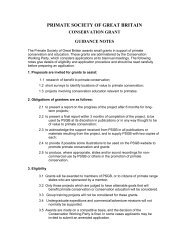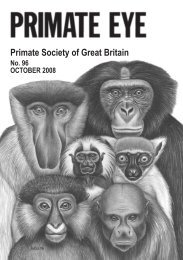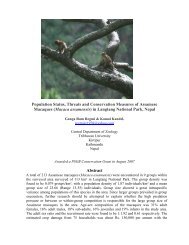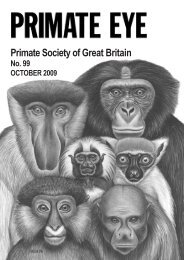2010 Vol 101.pdf (1.63mb) - Primate Society of Great Britain
2010 Vol 101.pdf (1.63mb) - Primate Society of Great Britain
2010 Vol 101.pdf (1.63mb) - Primate Society of Great Britain
Create successful ePaper yourself
Turn your PDF publications into a flip-book with our unique Google optimized e-Paper software.
governments, researchers and the public to scientific research and activity.<br />
Part three, in contrast, returns readers to the present (with a chapter detailing<br />
the most recent developments in the infanticide controversy) and the<br />
broader viewpoint associated with an evaluation <strong>of</strong> the role <strong>of</strong> “Controversy<br />
and Authority, Narrative and Testimony” in primatology and science in<br />
general.<br />
Rees states early on that she is not going to judge the winners <strong>of</strong> the<br />
infanticide controversy (and indeed, mentions that the open nature <strong>of</strong> that<br />
controversy helps in that it ensures she cannot view it “knowing who won”),<br />
but nonetheless manages to use her detailed history <strong>of</strong> this one debate to<br />
shed light on several intriguing aspects <strong>of</strong> primatology and science. In<br />
particular, my relatively modest knowledge <strong>of</strong> the history <strong>of</strong> primatology<br />
was substantially expanded – especially as many <strong>of</strong> the theoretical and<br />
methodological topics discussed were <strong>of</strong> relevance to a much wider part <strong>of</strong><br />
the field than just the infanticide debates. In addition, a number <strong>of</strong> puzzling<br />
questions about the philosophy and sociology <strong>of</strong> science are raised and<br />
discussed. Rees’s “fieldworker’s regress”, the situation in which<br />
observations can never be replicated in field science because <strong>of</strong> specifics<br />
and uniqueness <strong>of</strong> place and conditions, is linked to some interesting<br />
debates over the importance <strong>of</strong> personality to behavioural observations, our<br />
tendency to anthropomorphise the primates, and the role <strong>of</strong> theory in<br />
developing and testing hypotheses, all <strong>of</strong> which are ably evaluated in the<br />
book.<br />
At the same time, however, I would question whether the infanticide<br />
debates are really still “open”. As Janson (2000) states, research into<br />
primate infanticide today has largely moved on from questioning whether<br />
the behaviour is adaptive to consider the reproductive consequences on<br />
adult females and the counterstrategies they employ to minimise the<br />
consequences. That said, Rees does note in several places that the<br />
infanticide debates are more important to modern primatology in the USA,<br />
and, indeed, fourteen <strong>of</strong> her eighteen interviewees are, or were, based in<br />
American institutions. Perhaps, as she notes, the anthropological aspect <strong>of</strong><br />
American primatology (which drew more <strong>of</strong> its early practitioners from<br />
anthropology while European countries drew heavily upon zoology) is<br />
sufficient to explain the difference in opinion and justify the retention <strong>of</strong> the<br />
debate in that country; alternatively, perhaps there are just a few key players<br />
in the infanticide debates who refuse to accept the majority opinion. Indeed,<br />
The Infanticide Controversy does emphasise the importance <strong>of</strong> individuality<br />
– not only <strong>of</strong> place, but also <strong>of</strong> person – in the conception and design <strong>of</strong><br />
primatological research, suggesting that perhaps controversy is not so much<br />
an objective discussion as a conflict between personalities and world-views<br />
in a discipline which cannot, for good or for ill, conduct completely<br />
objective research. While many scientists may consider this an<br />
inconvenience or even a substantial barrier to research, however, Rees’s<br />
53






